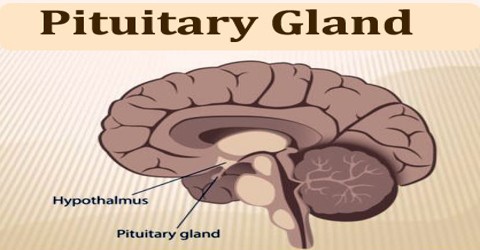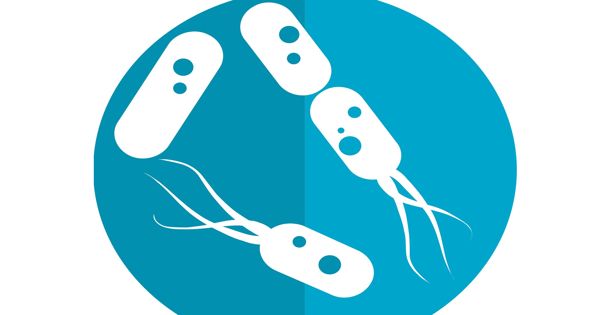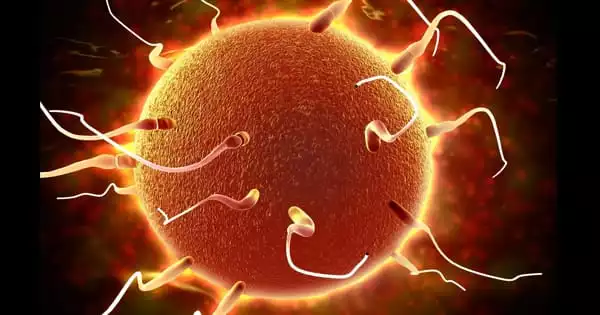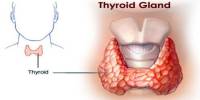Pituitary Gland
Definition
Pituitary gland is a pea-sized gland located in the center of the skull, inferior to the hypothalamus of the brain and posterior to the bridge of the nose. The pituitary gland is very important as it takes messages from the brain and uses these messages to produce hormones that affect many parts of the body, including stimulating all the other hormone-producing glands to produce their own hormones. For this reason it is often referred to as the ‘master gland’.
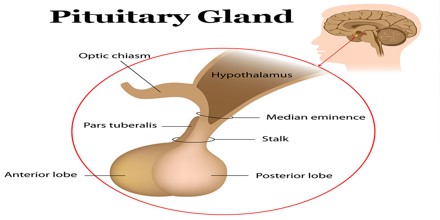
The anterior portion, whose secretions are directly controlled by the hypothalamus, produces hormones that regulate the function of most of the body’s hormone-producing glands and organs, including the thyroid and adrenal glands. Growth hormone is also produced by the anterior pituitary. The posterior pituitary releases antidiuretic hormone (ADH) and oxytocin.
Hormones secreted from the pituitary gland help control: growth, blood pressure, and certain functions of the sex organs, thyroid glands and metabolism as well as some aspects of pregnancy, childbirth, nursing, water /salt concentration at the kidneys, temperature regulation and pain relief. It secretes hormones from both the front part (anterior) and the back part (posterior) of the gland. Hormones are chemicals that carry messages from one cell to another through our bloodstream.
The pituitary is divided into three sections: the anterior, intermediate, and posterior lobes. The anterior lobe is mainly involved in development of the body, sexual maturation, and reproduction. The intermediate lobe of the pituitary gland releases a hormone that stimulates the melanocytes, cells which control pigmentation like skin color through the production of melanin. The posterior lobe produces antidiuretic hormone, which reclaims water from the kidneys and conserves it in the bloodstream to prevent dehydration.
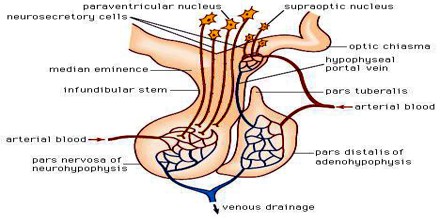
Structure and Function of Pituitary Gland
The pituitary gland has two parts, the anterior and posterior lobes, which are under the control of a part of the brain known as the hypothalamus. The hypothalamus secretes releasing hormones that pass through the circulation to the pituitary’s anterior lobe, where they trigger the production of hormones that control other glands. Nerve cells in the hypothalamus secrete two hormones that pass down nerve fibres to be stored in the posterior lobe until they are needed. The pituitary gland has an anterior lobe and a posterior lobe. It is linked to the hypothalamus, which lies directly above it, by a short stalk that contains nerve fibres and a specialized network of blood vessels known as a portal system.
Endocrine cells of the anterior pituitary are controlled by regulatory hormones released by parvocellular neurosecretory cells in the hypothalamic capillaries leading to infundibular blood vessels, which in turn lead to a second capillary bed in the anterior pituitary. This vascular relationship constitutes the hypothalamo-hypophyseal portal system. Diffusing out of the second capillary bed, the hypothalamic releasing hormones then bind to anterior pituitary endocrine cells, upregulating or downregulating their release of hormones. Anterior pituitary contains several different types of cells that synthesize and secrete hormones. Usually there one type of cell for each major hormone formed in anterior pituitary.
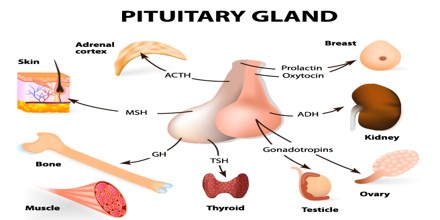
The Posterior pituitary is the back portion of the pituitary. It secretes the hormone oxytocin which increases uterine contractions and antidiuretic hormone (ADH) which increases reabsorption of water by the tubules of the kidney. Underproduction of ADH results in a disorder called diabetes insipidus characterized by inability to concentrate the urine and, consequently, excess urination leading potentially to dehydration. The urine is “insipid” (overly dilute). Hormones secreted from the pituitary gland help control the following body processes:
- Growth
- Blood pressure
- Some aspects of pregnancy and childbirth including stimulation of uterine contractions during childbirth (Parturition)
- Breast milk production
- Sex organ functions in both males and females
- Thyroid gland function
- The conversion of food into energy (metabolism)
- Water and osmolarity regulation in the body
- Water balance via the control of reabsorption of water by the kidneys
- Temperature regulation
- Pain relief
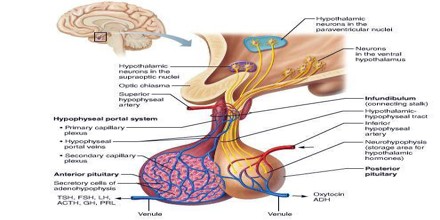
Pituitary Gland Works
The pituitary gland produces a number of hormones. Hormones are essential for many aspects of life. Some send messages to other endocrine glands to tell them to increase or decrease production of their hormones. One such example is TSH, which stimulates the thyroid to grow and produce thyroid hormones. The main hormones produced by the pituitary are:
- ACTH – adrenocorticotropic hormone
- ADH – anti-diuretic hormone or vasopressin
- FSH – follicle-stimulating hormone
- GH – growth hormone
- LH – luteinizing hormone
- PRL – prolactin
- TSH – thyroid-stimulating hormone
